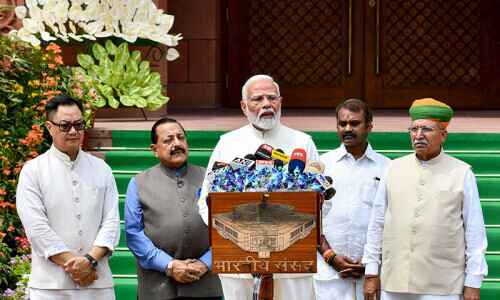Tuesday saw the swearing-in of India’s newly elected parliamentarians, but two outspoken opponents of the government were not allowed to assume office because they were imprisoned on accusations related to national security.
One is Amritpal Singh, a fiery preacher and Sikh separatist who was detained last year following a month-long police manhunt in Punjab province.
The other is Sheikh Abdul Rashid, also referred to as Engineer Rashid and a former state legislator from Indian-occupied Kashmir.
Rashid, who was detained January 2019 on suspicion of “terror funding” and money laundering, is scheduled to appear in court again on July 1, according to his attorney Ubaid Shams, who spoke to AFP.
Singh’s relatives said they were unsure if he would be able to take the oath. Singh was a supporter of the outlawed Khalistan movement, which called for an independent Sikh nation and provoked fatal conflict in the 1980s and 1990s.
“It’s uncertain if he will be released from prison,” Tarsem Singh, his father, told AFP.
He remarked from his rural Punjabi home, “We are at our village and haven’t heard anything from the government.”
“We’re not sure how the authorities feel about his release.” When members started taking their oaths in parliament on Monday, Hindu nationalist Prime Minister Narendra Modi was the first to call out Rashid’s name.
The 73-year-old Modi made an appeal for “consensus” on Monday to the empowered opposition in the wake of an electoral defeat that threw him into a coalition administration for the first time in ten years.
Gandhi named party secretary and legislative leader of opposition
Rahul Gandhi, Modi’s main opponent, was chosen on Tuesday to head the opposition in India’s parliament, a significant position that has been unfilled for ten years.
Gandhi will be “a bold voice for the common people of India” and make sure the government “is held firmly accountable at all times,” according to Congress party general secretary K C Venugopal, who made this claim in a statement to media.
Venugopal stated that Rahul’s mother, Sonia Gandhi, the chairperson of the Congress party, had written to the temporary speaker of parliament to inform him that her son “is appointed as the Leader of Opposition in the Lok Sabha,” India’s lower chamber.
The position has been unfilled for ten years because Congress, which was previously the majority party in India, failed to meet the requirements in two disappointing election cycles.
Despite popular anticipation of another easy victory, Modi and his Hindu-nationalist Bharatiya Janata Party, which had ruled outright for the previous ten years, were unable to repeat their two landslide victories this time around.
Shortly after taking his oath, he declared in a statement that “every patriotic Indian has a duty to protect the Constitution.”
“We will fully fulfill our obligation.”
Gandhi is one of several prominent opposition figures who are being prosecuted in cases they allege are motivated by politics and are part of Modi’s regime.
In a different Gujarati case from the previous year, he was given a two-year prison sentence in 2023, but he was spared jail time after filing an appeal with India’s highest court.
However, the penalty did result in his temporary exclusion from the legislature until his conviction was overturned by the Supreme Court.
Gandhi, 54, is the son, grandson, and great-grandson of former prime ministers, starting with independence leader Jawaharlal Nehru. His family dominated Indian politics for many years.








